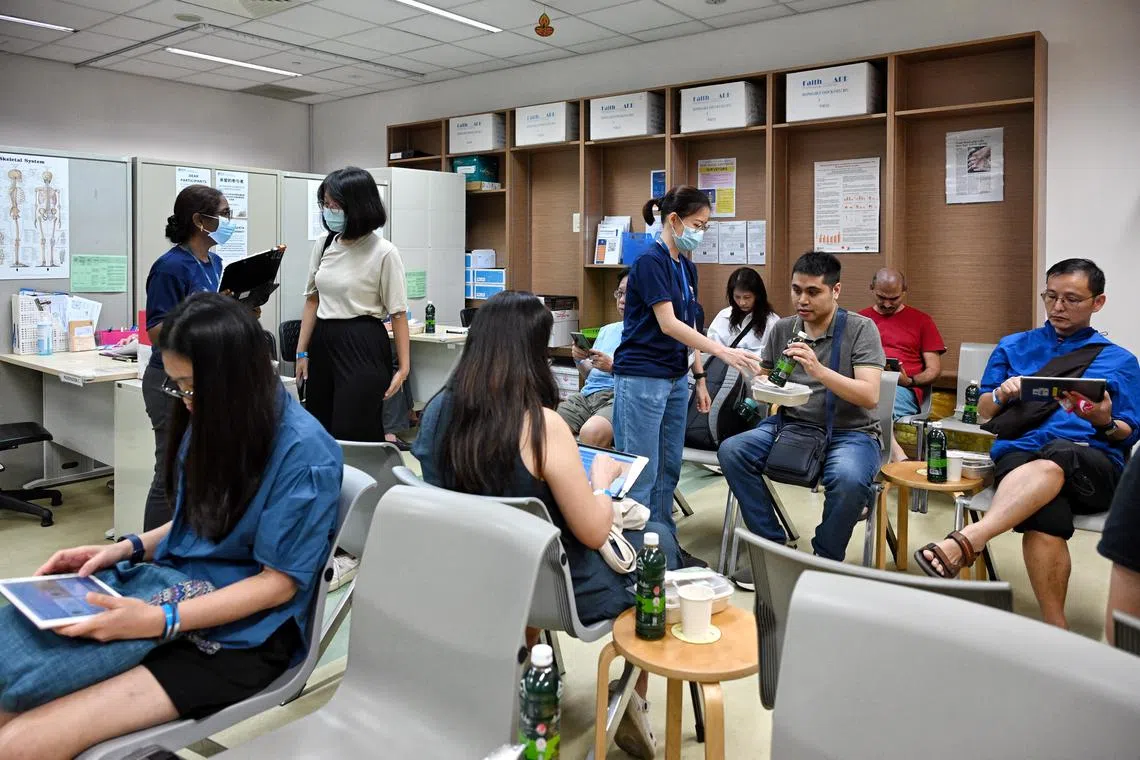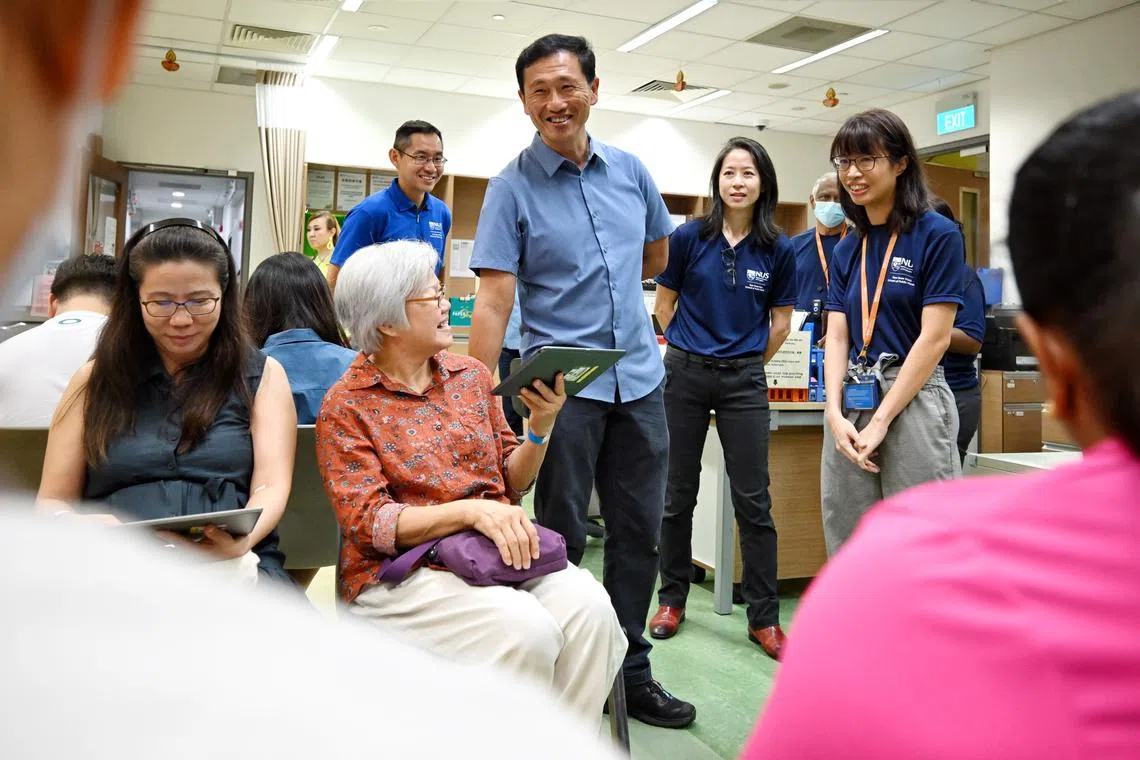Patient records from private hospitals to be added to national repository by 2025
Sign up now: Get ST's newsletters delivered to your inbox

Singapore Population Health Studies staff with participants undergoing health screenings, at the NUS Saw Swee Hock School of Public Health on Nov 9.
ST PHOTO: KUA CHEE SIONG
SINGAPORE - By 2025, all nine private hospitals in Singapore will contribute their patients’ health records to a national repository, to help doctors decide on the most efficient treatment for patients and weed out unnecessary repeat tests.
This existing repository – called the National Electronic Health Record, or NEHR – consolidates each patient’s diagnoses, medications, laboratory test results and drug allergies.
While all public hospitals, which handle 90 per cent of the country’s hospital workload, are already contributing to the NEHR, private hospitals are not yet on board.
Announcing the expansion of the NEHR on Nov 9, Health Minister Ong Ye Kung said: “Patients, especially those with chronic or complex conditions, often visit multiple clinicians. Historically, electronic medical records were siloed within individual healthcare providers. This has led to care fragmentation.”
But with a centralised data repository, errors can be minimised, added the minister.
“Once it’s recorded that you have a drug allergy, you reduce the chance of a doctor (giving) you a drug you might be allergic to. We can also remove frustrating repeated testing.”
Mr Ong was speaking at the 20th anniversary of the Singapore Population Health Studies, where he also announced how healthcare is becoming more personalised for patients.
In the last two decades, more than 90,000 patients have contributed their medical data to help researchers understand disease prevalence in Singapore’s multi-ethnic context. The studies aim to find out how lifestyle, physiology and genes influence a person’s risk of heart disease, for example.
The Ministry of Health (MOH) recently consulted all private hospitals that supported coming on board the NEHR, and some hospitals have started working with MOH to prepare their digital systems for the centralised repository.
By early 2025, new legislation that mandates nationwide contribution to the NEHR is expected to be passed, said Mr Ong.
Under the new Health Information Bill, all licensed healthcare providers and MOH-approved care providers, such as community pharmacists, will need to contribute data to the NEHR.
Polyclinics and private general practitioner clinics on the Healthier SG programme
The Bill will also establish a framework to govern the safe collection, access, use and sharing of health information across the healthcare ecosystem, said MOH in a statement.
Healthcare providers must have in place measures to protect medical data through timely updates of systems and software, as well as equip staff with practices to safeguard cyber security.
Hospitals and clinics also need to report cyber-security incidents and data breaches.
Patients have the choice to opt out of having their essential medical data shared in the national repository, said Mr Ong.
Professor Tai E Shyong, a senior consultant at the National University Hospital’s Division of Endocrinology, who looks after patients with diabetes, said data from the NEHR will be crucial when a major health event, like a heart attack, happens to a patient in between appointments.
He said: “If I ask a patient what happened to him in the last four months, it’s unlikely he will recall his (medical) information that I need. I have to prescribe medication... but I’m guessing. It’s different if I say to him: ‘Hey, I noticed you had a heart attack last month. Are you okay?’”
From the end of November, those enrolled in Healthier SG will get to benefit from more personalised health plans, such as more specific diet and exercise recommendations.
“For example, your doctor may recommend that you do aerobic activity of a certain intensity, frequency and duration. If your doctor makes dietary recommendations, it will highlight which foods to limit and the healthier alternatives you can opt for,” said Mr Ong, who was speaking at the NUS Tahir Foundation Building.

Health Minister Ong Ye Kung speaking to participants of the Singapore Population Health Studies on Nov 9.
ST PHOTO: KUA CHEE SIONG
As at August, more than a million people have enrolled in Healthier SG
Mr Ong also gave an update on how technology and wearables are increasingly being used to help patients improve their health. The Health Promotion Board (HPB), for example, is working with Google, software company ConnectedLife and Fullerton Health on a mobile app.
The app will combine patients’ clinical data – like body mass index and blood pressure – and lifestyle data, such as level of physical activity, collected through wearable fitness trackers. Fullerton Health doctors will access patients’ data via a dashboard and work with patients on improving their health.
HPB is also collaborating with pharmaceutical company Abbott and start-up Health2Sync to roll out a coaching programme for people at risk of diabetes.
In another pilot, participants will wear a patch on their arm that will allow them to monitor their glucose levels over time, and how the levels change with different types of food.
Mr Ong noted that while these monitoring devices can help people be more mindful about their food choices, the patches can be quite expensive.
“Nevertheless, we continue to try out new pilot projects, and I hope with sharper intervention techniques, more competitive pricing and more players in the market... (these devices) can, over time, become cost-effective,” he said.



